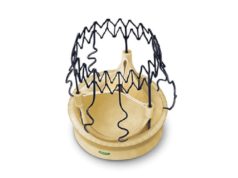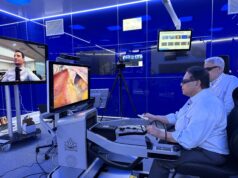Medinol has announced that enrolment in its BIONICS trial, a global, prospective, randomised, multicentre, clinical trial designed to evaluate the safety and effectiveness of a new coronary stent system—the first ever elastomeric drug-eluting stent (eDES)—has been completed. The study has enrolled 1,918 patients in the USA, EU, Canada and Israel.
According to a press release, the BIONICS clinical trial is a 1:1 randomised study comparing the eDES system to Medtronic’s Resolute Integrity stent system. The primary endpoint of the study is target lesion failure as determined at 12 months. The results of the BIONICS trial will be submitted to the FDA for the US approval of the eDES for the treatment of patients with narrowing of their coronary arteries.
The press release reports that there are several aspects of the eDES system that differentiate it from other products currently available. It is coated with an elastomer that maintains a smooth and uniform stent surface designed to prevent the cracking or peeling that may occur with brittle polymers used in other drug-eluting stent during the stent crimping and deployment processes. The stent is comprised of cobalt chromium and manufactured and coated in flat panels using Medinol’s patented QualitySurface technology and contains a “limus” family drug, intended to prevent restenosis.
The eDES design is based on the NIRxcell stent architecture intended to enhance conformability, scaffolding and radial strength. The delivery system is unique as well, featuring a distinctive spring tip that is simultaneously more pushable and flexible than the plastic tips used on other delivery systems.
David Kandzari, director of Interventional Cardiology at Piedmont Heart Institute, Atlanta, USA, and principal investigator for the BIONICS trial, says: “The design of eDES enhances stent deliverability and conformability for the treatment of complex coronary disease. The system is unique from other products currently being offered, and will be a great addition to our current treatment options.” He adds that he was impressed with several aspects of the study, noting: “One of the distinctive aspects of the study is how inclusive the enrolment criteria is, allowing for almost all patient populations to be included in the study, and making it very relevant to the populations we see in our practices today. We look forward to getting the results after follow up.”
More information about BIONICS and the eDES will be presented at TCT 2015 in San Francisco on Wednesday October 14 at a satellite breakfast symposium entitled, “The BioNIR eDES: The Role of Uniformity in Stent Design to Minimize Restenosis.”










